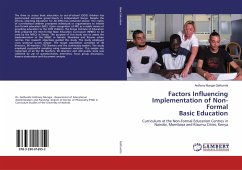
Factors Influencing Implementation of Non-Formal Basic Education
Curriculum at the Non-Formal Education Centres in Nairobi, Mombasa and Kisumu Cities, Kenya
Versandkostenfrei!
Versandfertig in 1-2 Wochen
54,99 €
inkl. MwSt.

PAYBACK Punkte
27 °P sammeln!
The drive to access basic education to out-of-school (OOS) children has preoccupied successive governments in independent Kenya. Despite the efforts, attaining Education for All (EFA) has remained elusive. The reality of out-ofschool children prompted individuals or organisations to initiate non formal education (NFE). Upon recognition of NFE as a viable means of providing education to the OOS children, the Kenya Institute of Education (KIE) prepared the Non-formal Basic Education Curriculum (NFBEC) to be used by the NFECs in Kenya. The purpose of this study was to assess the implementation of...
The drive to access basic education to out-of-school (OOS) children has preoccupied successive governments in independent Kenya. Despite the efforts, attaining Education for All (EFA) has remained elusive. The reality of out-ofschool children prompted individuals or organisations to initiate non formal education (NFE). Upon recognition of NFE as a viable means of providing education to the OOS children, the Kenya Institute of Education (KIE) prepared the Non-formal Basic Education Curriculum (NFBEC) to be used by the NFECs in Kenya. The purpose of this study was to assess the implementation of the NFBEC in Nairobi, Mombasa and Kisumu urban centres. Five research objectives guided the study. The study employed cross sectional survey design. The target population consisted of 36 directors, 96 teachers, 750 learners and the community leaders. The study employed purposeful sampling using maximum variation. The sample size comprised of all the 96 teachers, 36 directors and 420 pupils.Data was collected by use of questionnaires, interviews, focus group discussions, lessons observation and document analysis.












